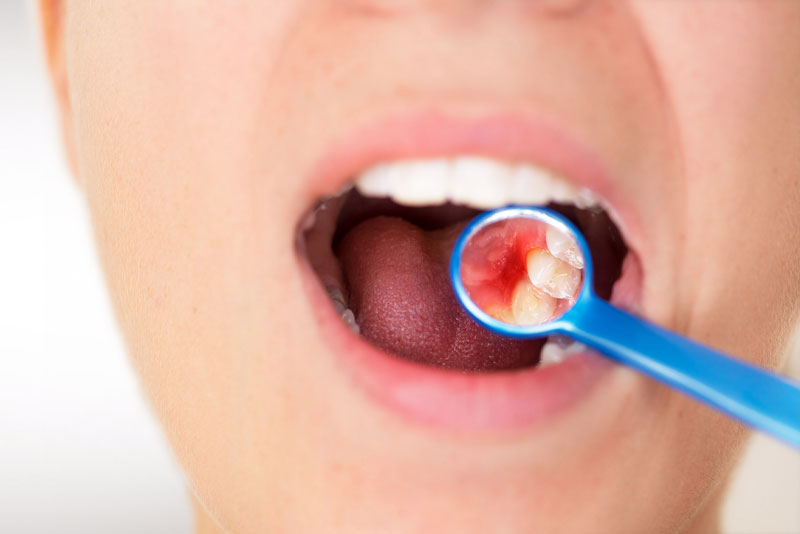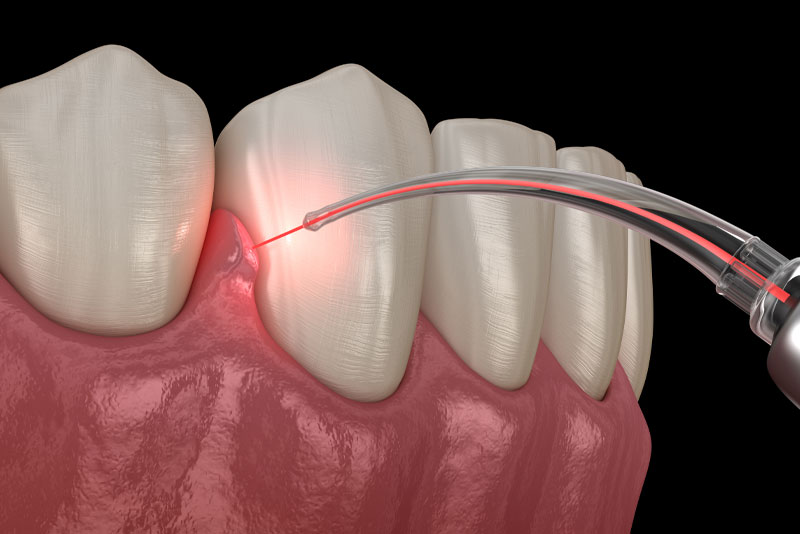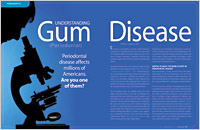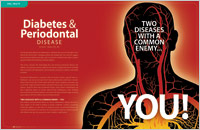
Why Treat Gum Disease?
Gum tissue plays an important role in the health of your mouth. In addition to supporting your teeth and jawbone, gum tissue creates a barrier against bacteria. When plaque is left to accumulate on your teeth, it will harden into tartar and release bacterial toxins that irritate your gum tissue, breaking the healthy seal. You may not realize you have gum disease in its earliest stage, especially if bleeding gums when you brush or floss is commonplace. Unfortunately, it’s a primary symptom of gum disease! If you don’t seek treatment at this stage, gum disease will continue to infect your gum tissue, damage bone, and loosen teeth. Advanced stages of gum disease, where chronic infection is present in the mouth and body, can even aggravate systemic conditions like diabetes, respiratory disease, and heart disease. Don’t wait to get treatment for gum disease in Abilene, TX if you’ve noticed your gums are tender and red or bleed easily when you brush and floss!

Symptoms of Gum Disease
- Tender gums that bleed easily
- Gums that are pulling away from teeth
- Teeth that are shifting or loosening
- Gums that are tender, red, or swollen
- Persistent bad breath or bad taste in mouth

Laser Therapy: Minimally Invasive Treatment
If you’ve been diagnosed with gum disease, you can generally choose to undergo laser therapy instead of scalpel-based surgery to treat your gum disease! Using our diode laser, we can vaporize the bacteria from the teeth and periodontal pockets, without making incisions or harming your healthy gum tissue. Laser therapy involves using a beam of light to target bacteria and diseased tissue, effectively eradicating them. Patients choose laser gum disease treatment because it leads to a more comfortable, healthy, and rapid recovery, even with advanced cases of periodontal disease. However, we provide all conventional treatments for gum disease, too, all of which can effectively manage your gum disease and help restore a healthy, functional smile.
Get in Touch
Our Select Periodontal Treatments
Scaling and root planing is the non-surgical first step for treating periodontal disease. This “deep cleaning” begins with removing bacteria and calculus from your teeth and cleaning the periodontal pockets. Next, we smooth your tooth surfaces so it is more difficult for plaque and bacteria to accumulate. This helps healthy gum tissue reattach and form a tight seal around your teeth once again.
For more severe cases of gum disease, all the infected tissues must be removed in addition to deep cleaning the teeth and periodontal pockets. A gingivectomy gets rid of the diseased gum tissue around the teeth, effectively reducing the pocket depth once they heal back around the tooth roots. We’ll also remove the bacteria and calculus from the teeth above and below the gumline.
Advanced cases of gum disease have left much of the gum tissue too infected to save, have caused irreversible damage to the bone underneath, and have put teeth at risk of becoming loose or falling out. Osseous surgery involves gaining access to the bone and underlying tissues so that the area can be cleared of all bacteria. Diseased gum tissue is removed and the teeth are cleaned with scaling and root planing. Once these steps are complete and antibiotics are placed in the pockets, the gum tissue is sutured back around the teeth.
All stages of gum disease, aside from gingivitis, can only be managed and not cured. We provide this through periodontal maintenance every 3-4 months. These appointments involve deep cleanings of the teeth and periodontal pockets. This removes all traces of bacteria and calculus so that the gum tissue and bone remain healthy and strong.
Peri-implantitis is essentially gum disease that affects gum tissue around a dental implant instead of natural teeth. Treating peri-implantitis is critical to ensuring the longevity and stability of a dental implant. We’ll remove the calculus and bacteria from on and around the dental implant, in addition to removing any diseased gum tissue. We can accomplish this using our diode laser, providing a more efficient treatment and a faster, more comfortable recovery.
Related Periodontal (Gum) Disease Articles
The Link Between Heart & Gum Diseases
Inflammation has emerged as a factor that is involved in the process of Cardiovascular Disease (CVD), which commonly results in heart attacks and strokes. While the precise role inflammation plays in causing chronic CVD remains an area of intense current investigation, much more is now known. The good news is that, based on current research, we know that if we can reduce the inflammation caused by periodontal disease, we can reduce the risk for heart attacks and strokes...
Read More

Understanding Gum (Periodontal) Disease
Have your gums ever bled when you brushed or flossed? This most commonly overlooked simple sign may be the start of silent (periodontal) disease leading to tooth loss. Learn what you can do to prevent this problem and keep your teeth for life…
Read More

Diabetes & Periodontal Disease
Periodontal (gum) diseases are inflammatory conditions that were once thought to have affected the mouth alone. Emerging evidence has changed this view and now suggests that periodontal diseases may play a role in numerous conditions that impact systemic (general) health and well being, including diabetes.
Read More



